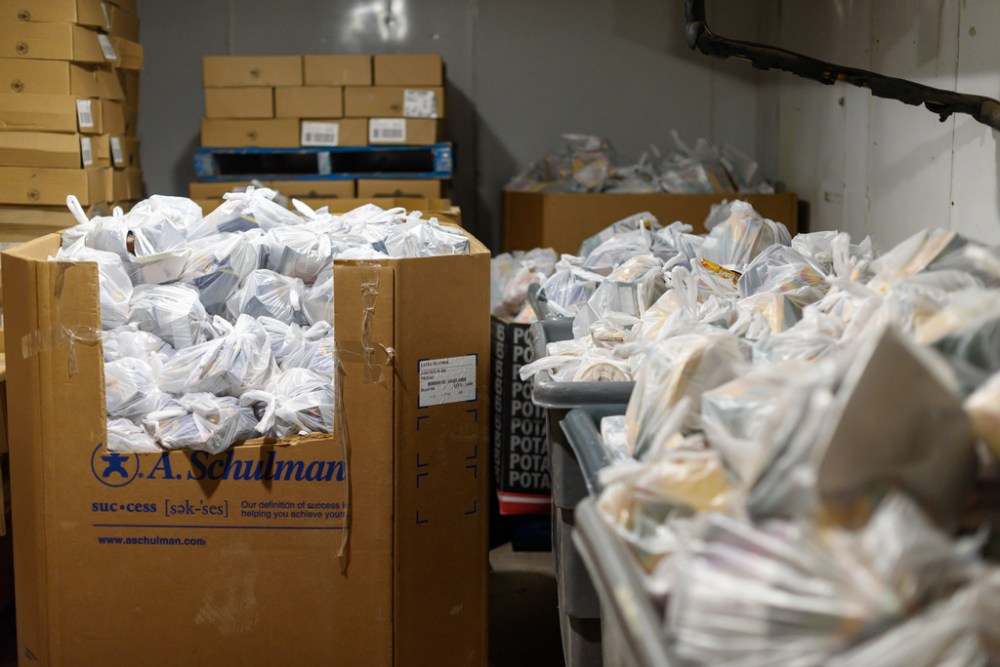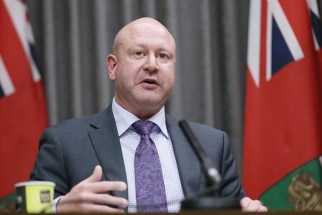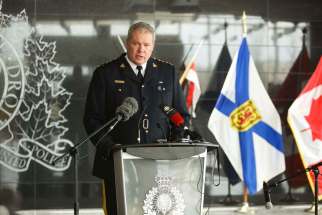Manitoba finally takes first step to help the hungry during crisis
Read this article for free:
or
Already have an account? Log in here »
To continue reading, please subscribe:
Monthly Digital Subscription
$1 per week for 24 weeks*
- Enjoy unlimited reading on winnipegfreepress.com
- Read the E-Edition, our digital replica newspaper
- Access News Break, our award-winning app
- Play interactive puzzles
*Billed as $4 plus GST every four weeks. Offer only available to new and qualified returning subscribers. Cancel any time.
Read unlimited articles for free today:
or
Already have an account? Log in here »
Hey there, time traveller!
This article was published 23/04/2020 (1744 days ago), so information in it may no longer be current.
After weeks of refusing to introduce measures to boost food security, the province has issued a bold request for proposals from Manitoba businesses able to provide five-day meal packages to 15,000 low-income elementary and middle school-aged children.
Manitoba is among the last jurisdictions to turn its attention to food security, even as demand at Winnipeg Harvest, the province’s main food bank, has soared by more than 30 per cent amidst record job losses. Only Manitoba and Saskatchewan have failed to provide direct emergency support to food banks.
The RFP, which was dated April 22, is seeking proposals to supply “easy-to-prepare nutritious meal packages along with educational materials and recipes to assist parents in preparing and providing meals to school-aged children from low-income households.” The contract for providing the meal packages will be for a minimum of four months beginning in mid-May.
The RFP notes that more than 34,000 students receive some form of nutrition support through various programs offered by school divisions and other non-profit partners. The successful company or consortium would be asked to not only create and package the meals, but also distribute them through 17 “hubs” — six in Winnipeg and another 11 throughout the rest of the province, including the North.
There are a lot of details missing from the RFP that, at this point, the province is not willing to share. Families Minister Heather Stefanson issued a statement via email that offered little in the way of additional information, but did promise “more details on this plan in the coming days.”
This project appears to be a bold effort to address two major needs at the same time: provide more food to the most vulnerable people in the province; and create additional business opportunities for Manitoba’s beleaguered restaurant and food-services industry.
Sean Jeffrey, executive director of the Manitoba Restaurant and Food Services Association, said he was given advance warning that this RFP was coming, and that it was an attempt to involve struggling restaurants in boosting the province’s overall food security network.
Currently, only 75 per cent of the restaurants in Manitoba are still operating in some fashion, Jeffrey said. However, those restaurants are earning only about 20 per cent of their normal receipts and cannot actually cover the costs of staying open. The result is a combined industry loss of more than $1.5 million each day, he added.
However, Jeffrey said the province’s ambitious plan — which requires firm proposals by April 27 so that meal packages can be delivered in mid-May — is logistically challenging and it’s not clear whether the average restaurant will be able to participate.
“We certainly appreciate what they’re trying to do,” he said. “But we’re still not entirely sure anyone can do this in the time frame they’ve provided. What they’re asking for would be an enormous challenge.”
There are also questions about whether this would help or hurt Winnipeg Harvest as it faces unprecedented demand for food hampers. A spokeswoman for the food bank declined to discuss the province’s meal-package proposal until they had a chance to study it more closely.
One of the major concerns at Winnipeg Harvest is whether this program would eliminate any possibility of government support to the food bank network in Manitoba. Winnipeg Harvest had been lobbying Premier Brian Pallister for the kind of support that has been extended in other provinces.
Historically, the food bank network in this country has received very little direct government funding, relying instead on private donations of cash and food. In Manitoba, where Winnipeg Harvest supplies satellite food banks in 300 other communities across the province, monthly demand has soared to more than 90,000 people.

However, massive job losses have meant that the increased demand has been accompanied by a 60-per-cent drop in cash and food donations. Other provinces have seen the same trends and acted early in the pandemic response to shore up food bank networks.
Nova Scotia was one of the first provinces to step up on March 19, with $1 million in emergency funding to food banks and a $50 monthly increase to people on income assistance. Then it was Ontario, which announced on March 23 that it was providing $200 million in emergency funding for homeless shelters, food banks and the Red Cross.
On March 29, British Columbia announced $3 million in funding for food banks. In early April, Alberta provided $3 million in direct funding to food banks and another $2 million in matching funds for private donations. And even Ottawa got in on the act with a $100-million emergency food bank funding pledge in early April.
Grocery stores — including Sobeys, Safeway and Red River Co-op among others — are trying to marshal more donations of food. And others are stepping up to support food banks.
In the last month alone, Winnipeg Harvest has received surplus milk and cheese from Manitoba farmers. Manitoba’s famous Bothwell Cheese has donated some of its products. Winnipeg jeweller Hillary Druxman is selling a special-edition silver necklace, with the proceeds going to Harvest. Winnipeg Jets players ponied up $100,000 early on in the pandemic.
dan.lett@freepress.mb.ca

Dan Lett
Columnist
Born and raised in and around Toronto, Dan Lett came to Winnipeg in 1986, less than a year out of journalism school with a lifelong dream to be a newspaper reporter.
Our newsroom depends on a growing audience of readers to power our journalism. If you are not a paid reader, please consider becoming a subscriber.
Our newsroom depends on its audience of readers to power our journalism. Thank you for your support.





